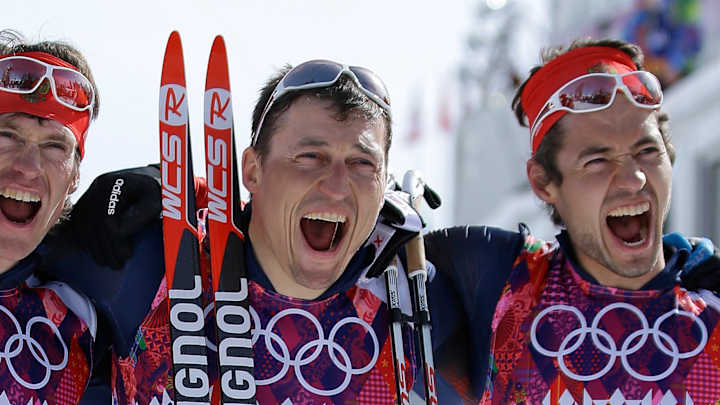Russia goes from worst to first, wins medals tally; U.S. second

SOCHI, Russia (AP) Russia's post-Soviet athletic decline hit bottom at the Vancouver Olympics, where the once dominant winter sporting nation left with only three gold medals and the daunting task of rebuilding its team in time to host the Sochi Games.
Four years later, the Russians are back on top of the winter world.
After a stunning podium sweep Sunday in the men's 50-kilometer cross-country race and another gold in the four-man bobsled, Russia finished the Winter Games with more total medals and more gold medals than anyone else. It was a worst-to-first rise that surprised even the most devoted Russian fans.
''You probably didn't believe that Russia could win the medals table, just like Canada did in Vancouver,'' said Alexander Legkov, who won the 50-kilometer cross-country race. ''I believed it could happen. Now it happened and that's great.''
Actually, Russia did Canada one better. The Canadians finished first in gold medals in Vancouver, but were third in the overall tally. The Russians had 13 gold medals in Sochi - their highest Winter Games total ever - and 33 total medals. Norway finished second in the race for gold with 11, while the United States was second on the overall medal table with 28.
Evgeni Plushenko, Julia Lipnitskaia and Adelina Sotnikova helped restore Russia's prominence in figure skating, Alexander Zubkov won two gold medals in a stirring late-career return to the top in bobsled and the unprecedented cross-country sweep on Sunday helped everyone forget about the incredible disappointment that was Russia's men's hockey team.
''The country believed in us. But nobody believed that Russia would even be in the top three in total medals, but we have won,'' Zubkov said.
For a nation that finished first or second in gold medals in every Winter Games it entered as the Soviet Union, Vancouver was a wake-up call. The three gold medals there put Russia in 11th place, a failure so humiliating that it prompted an audit into widespread misspending and cost many of the country's top sports officials their jobs.
It also turned up the pressure on the Russians to re-invest in a sports program that suffered from apathy in the years after the Soviet fall. IOC President Thomas Bach said Sunday that Olympic officials made it clear to Russia that building roads, arenas and hotels in Sochi wasn't enough.
The IOC ''always made them aware that it is not enough just to organize the games, but that we also need a good home team,'' Bach said. ''So they were working hard after the shock they had in Vancouver and I think it's just remarkable progress that has been made within four years of Vancouver to today. We can only congratulate the Russian team to this great success.''
To be fair, five of the Russian gold medals were won by athletes who weren't Russian citizens four years ago. Speedskater Victor Ahn, who came to Russia after a falling out with his native Olympic team in South Korea, won three gold medals and a bronze. Vic Wild, an American who moved to Russia when he married Russian snowboarder Alena Zavarzina, won two snowboarding golds.
That mattered little to fans who were aching to show the rest of the world that Russia is a pushover no more.
''Vancouver is now left far behind. One cannot compare the results,'' said Khasan Zhilov, a 37-year-old fan from Moscow. ''I came here yesterday to see it with my own eyes. And I'm saying - it's a bomb. Unbelievable.''
A conversation about Russia's turnaround can't be had without an examination of its past difficulties with doping.
At four of the previous six Olympics, both summer and winter, Russian athletes were stripped of medals after failing doping tests. The situation had grown so dire that former IOC President Jacques Rogge publicly chastised the Russians and demanded that they ''respond with strong anti-doping actions'' in Vancouver.
Russian anti-doping agency managing director Nikita Kamaev told The Associated Press before the Sochi Games started that ramped up testing resulted in about 180 busts in 2013, an almost 70 percent year-on-year increase in positive cases.
So far in Sochi, six athletes have tested positive for banned substances. None have been Russian.
''It was a fantastic performance, great work by the coach and federation. They did everything professionally and put such a great ending,'' Vitaly Mutko, Russia's ministry of sport, told the Russian television network R-Sport. ''The team has exceeded the plan. The rest isn't important. I congratulate everybody.''
